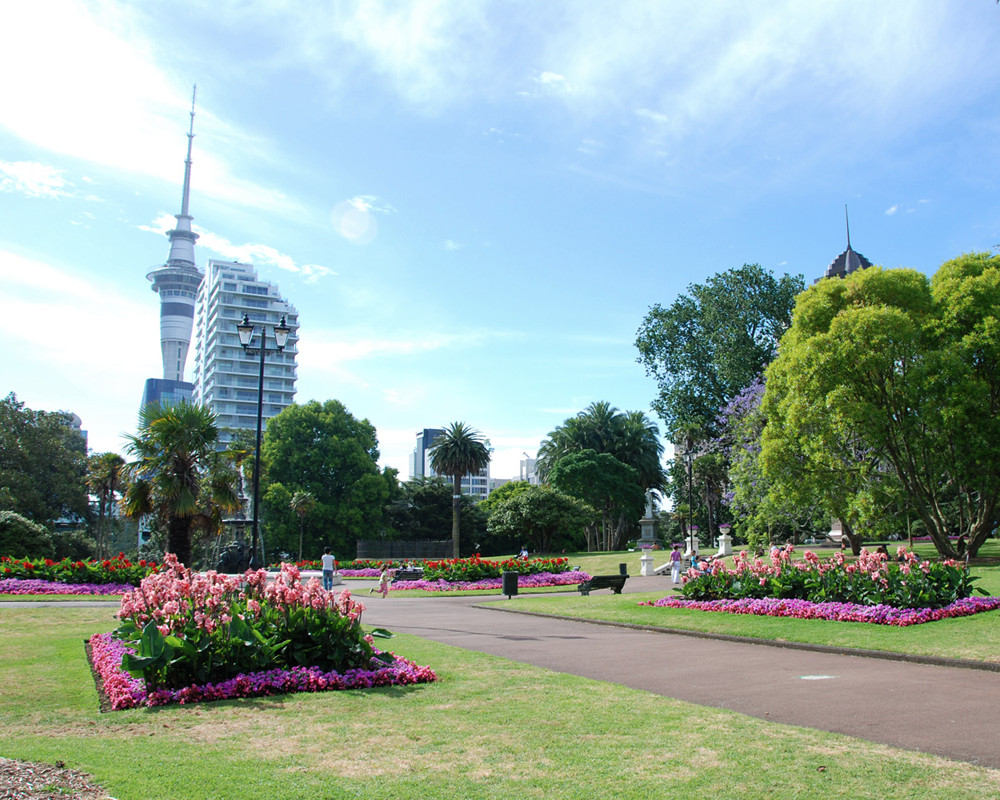
New Zealand needs a fair deal between the food industry, the government and society to effectively prevent and treat obesity.
Together with the Tony Blair Institute for Global Change, the Helen Clark Foundation will adapt the Institute's recent report Fit for the Future: A Fair Deal on Food for a Healthier Britain for the New Zealand context.
Read moreAotearoa New Zealand faces a unique set of challenges in the 21st century. From climate change and environmental degradation to delivering infrastructure and managing urban growth, we need innovative and evidence-based solutions to build a more sustainable and resilient future for all New Zealanders.
This research stream will bring together evidence and research that explores critical issues and develops practical solutions across a range of areas, including:
We want Aotearoa New Zealand to be somewhere that everyone thrives. Yet, disparities in health, access to resources, and opportunities remain a challenge. This research stream dives deep into these issues, seeking solutions for a healthier and more equitable Aotearoa.
In this research stream we’ll explore critical topics like:
There are a number of short and longer term problems facing our economy. From rising inequality and inflation to unlocking our true productivity potential, we need innovative and evidence-based solutions to build a more prosperous economy that benefits all New Zealanders.
This research stream will explore issues and develop policy solutions across key areas, including:
Our world is increasingly turbulent and unstable. With the rise of online hate speech, the complexities of maintaining New Zealand’s independent foreign policy, navigating a rapidly-evolving media landscape, responding to global humanitarian crises and conflicts, and growing concerns of corruption in an increasingly interconnected world.
This research stream is dedicated to understanding these issues through a New Zealand lens. Particularly using the experience and knowledge of our patron, the Rt. Hon. Helen Clark, we'll explore how these global forces impact New Zealand and its people, and how we can best navigate this complex world.
Our research focus areas include:
It's long been understood that a good start in life is important, but now a growing body of research demonstrates how significant parental mental health in particular is to long-term family and whānau wellbeing. Mental distress during the perinatal period (from the beginning of pregnancy until a year after birth) can have severe long-term consequences, not only for parents in distress, but also for their babies.
This is a concerning finding at a time when DHBs report increasing complexity of maternal mental health needs and high unmet need for support. However, it also presents an important opportunity: if we can understand what contributes to this distress, and put in place policies to actively remove or alleviate it, we can not only support mothers and parents who are struggling, but also significantly improve intergenerational outcomes - a critical public policy challenge and the subject of a current Productivity Commission inquiry.
Associate Fellow Holly Walker has been leading our research in this area. In April 2022 we published our report, Āhurutia Te Rito, looking at what contributes to perinatal distress in Aotearoa New Zealand and identifying opportunities to better support new parents and their babies. It focused in particular on how to support and enable community-led solutions. You can read the report here. On 28th July we hosted a public webinar to share key insights and recommendations from this report.
In September 2022 we hosted a policy roundtable. Our goal was to support policy change that restores and enhances the special status of parents, pēpī, and whānau at this crucial time. You can see some of the outcomes here.
This work has been carried out with the generous support of The Tindall Foundation and the Rātā Foundation.
Read moreAotearoa New Zealand has Scandinavian expectations of the welfare state but a short term attitude to investment and taxation.
Together with NZIER, we propose to produce a paper focusing on the main sector which underpins Aotearoa New Zealand’s wealth – the primary sector – in the context of lifting productivity during the COVID recovery.
Read more
New Zealand has recently dealt with significant natural disasters, including the Auckland anniversary floods and Cyclone Gabrielle, resulting in tragic loss of life and extensive property damage. Responding to the escalating impacts of climate change-induced extreme weather events requires us to rethink many of our current approaches to things like urban design and water management.
Our first report, Sponge Cities, explores the potential of transforming urban areas into ‘Sponge Cities’ as a proactive measure to minimise future risks. Current urban design and flood management practices that rely on aging grey infrastructure are proving inadequate against the rising threats posed by rainfall-related risks. Sponge Cities advocates for harmonious water resource management through innovative measures such as ‘daylighting’ streams, reducing impervious surfaces, enhancing green spaces, and implementing green infrastructure. By creating space for water, these approaches complement conventional engineering solutions.
Our second report, A Shared Future, calls for significant change to the way communities are engaged in climate adaptation planning. With climate change reshaping our lives, culture, and public health in profound ways, this issue has never been more urgent. The report finds that involving communities in adaptation efforts is just as crucial as finding the right engineering solutions. Adapting to a changing climate will be disruptive and intrusive for many. If meaningful community engagement is neglected, it’s likely to create division, weaken the effectiveness of adaptation efforts, and make them less credible and durable.
Read moreCurrently, infrastructure requirements across the country outstrip available funding. To service our growing population, we urgently need to consider the strategy and policy adjustments that will ensure we can build what needs to be built in more effective and efficient ways.
Read moreThis report will examine a range of topics relating to transparency and integrity in New Zealand’s political, government and financial systems - including political donations, lobbying, foreign bribery and beneficial ownership.
Read moreAotearoa needs low-traffic neighbourhoods and cities to reduce emissions, improve road safety, and to create the connected urban communities we need in a post-pandemic future. We need urban design decisions that focus on safety so that urban public spaces are open to everyone.
In this research stream, we set out why transport matters for equity, illustrate why reducing car dependence is the key to decarbonising urban transport, explain the risks of pursuing rapid decarbonisation without adequately considering equity, and lay out a path for how Aotearoa New Zealand can transition to the connected, low-traffic cities we need.
We also consider how denser city living, which will be an increasingly important feature of Aotearoa New Zealand’s cities in future, increases demand for urban public spaces. This demand exacerbates existing inequities that impact on how safe we feel, which we suggest can be addressed through coordinated urban design decisions.
We take this urban focus because, as we outlined in a recent report about Aotearoa New Zealand’s diaspora and demographic trends, nearly three quarters of Aotearoa New Zealand’s population growth in the next 30 years will happen in cities. Tāmaki Makarau Auckland alone will account for half this growth. By 2048, there will be almost one million more people living in our cities than there were in 2018.
This growth places increasing pressure on our urban infrastructure and creates demand for new investment, including new and improved transport infrastructure and public spaces.
Read moreHealth Equity Fellow Matt Shand worked on a range of research projects that sought to improve health equity in Aotearoa New Zealand. The research produced outputs on the topics of reducing alcohol harm and healthy food environments.
This research was undertaken in partnership with the Health Coalition Aotearoa and the MAS Foundation.
Read moreLoneliness is a significant challenge for many people in Aotearoa New Zealand, and especially so during the COVID-19 pandemic. Deputy Director and WSP Fellow Holly Walker investigated policy approaches to helping minimise the negative effects of loneliness.
This work includes a submission to the Interim Mental Health and Wellbeing Commission, an article in the journal Policy Quarterly, and two research reports.
This research was produced as part of our partnership with WSP New Zealand.
Read moreThe global COVID-19 pandemic caused a major social and economic shock to Aotearoa New Zealand, and these impacts have not been distributed evenly.
This work explored what an inclusive growth agenda for Aotearoa New Zealand could look like.
Read moreDrug use is a reality in New Zealand, and the results of our current policy approach damage our health, worsen social equity, and drive crime. The status quo is unacceptable, and our research explores how we can do better.
Read moreIn the wake of the March 2019 Christchurch terrorist attack, which was livestreamed in an explicit attempt to foster support for white supremacist beliefs, it is clear that there is a problem with regard to regulating and moderating abhorrent content on social media. Both governments and social media companies could do more.
This research explored how we can best reduce harmful content online, and ensure that the internet becomes a sphere of equal public participation.
Read more